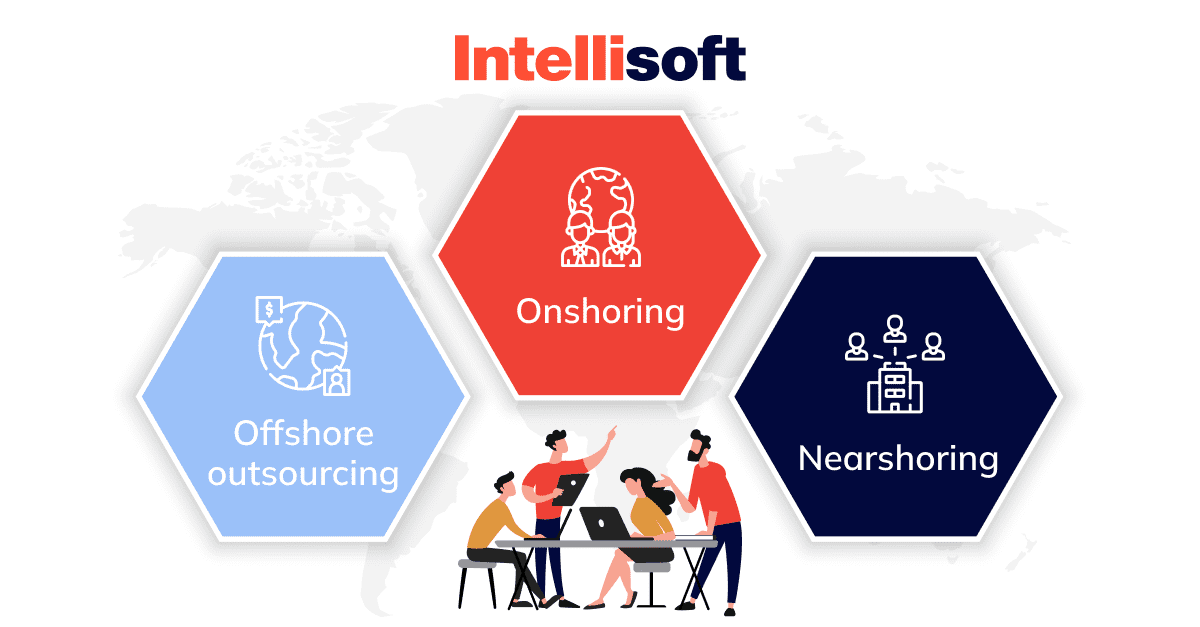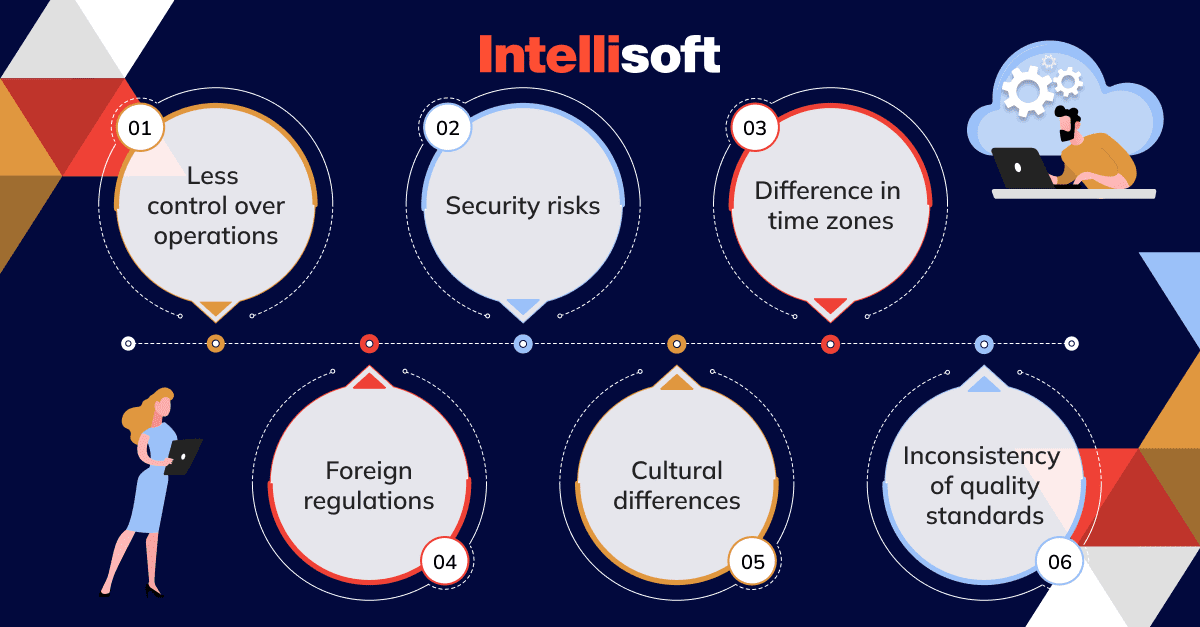Connection and collaboration are the lifeblood of human relationships. There is real power in helping one another out—it makes us stronger and more resilient. It’s not at all surprising, really, considering the range of our eclectic tastes, skills, and the rich tapestry of cultural and social views that sweep across the globe. Therefore, learning offshoring pros and cons is a must.
In the IT world, this team spirit is manifested in offshoring. Imagine contacting an experienced professional in your field who happens to work for another company or even in another country to apply their expertise to your project. Companies leverage pros and cons of offshoring for many reasons; maybe they do not need a specialist full-time, or that might be a collaborative project or even cost-cutting.
At IntelliSoft, we have been offering these team extension services for over 15 years. We have seen everything: projects with the most whimsical requirements, extensive long-term initiatives, and projects that required painstaking management. In this article, we will inspect the subject of offshoring back-to-back, which takes us to look at its challenges, risks, and advantages to get a clear vision when deciding whether or not this is the best solution for you.
Table of Contents
What is Offshoring?
Offshoring is moving all or some of the company’s operations to another country, mainly to the provider specializing in specific fields. Typically, businesses resort to offshoring development for lower prices and high-quality services. During offshoring, a company finds and employs people abroad who start working under the company’s name.
In its traditional meaning, offshoring presupposes that a business physically relocates its operations overseas, but in this article, we’ll talk about offshore outsourcing – delegating tasks to experts from overseas. Usually, businesses hire employees from Latin America and Eastern Europe since they offer lower costs but still provide an exceptional quality of work.
According to recent research, the outsourcing market size was valued at USD 261.9 billion in 2022 and is projected to expand at a compound annual growth rate (CAGR) of 9.4% from 2023 to 2030.
Some people confuse offshoring development with outsourcing and other types of team extension, thinking they are all the same. It’s not the case, and you need to clearly understand the pros and cons of offshoring and outsourcing to figure out which one suits your needs best.
Popular types of team extension
There are three most popular types of team extension:

- Offshore outsourcing: The most popular example is production offshoring or business process outsourcing. This is when you relocate manufacturing/development processes to teams located overseas. Google hiring an employee from Ukraine to assist with their project is an example of offshore outsourcing. Asia and Eastern Europe have many excellent talented experts who provide high-quality services for a lower price than other countries, making these destinations extra popular among companies looking for third-party providers.
- Onshoring: This type is also known as local outsourcing or domestic outsourcing. It involves recruiting a software outsourcing company in your country, which will require more money than offshoring. However, you benefit from the same language, culture, and working hours since you are all in the same region.
- Nearshoring: Nearshoring consists in working with experts from closer regions, such as Eastern Europe or any other neighboring country. These experts will likely work in the same time zone, speak the same language, or have great English skills.
IT offshoring and outsourcing: the difference
The two terms are often used interchangeably, but they are different. Offshoring development involves relocating complete business processes to providers or separate employees in other countries. Outsourcing means contacting external companies to handle tasks, regardless of where they are located.
Thus, the deciding factor here is geographical distance. Offshoring is always about counties located far away, while outsourcing can happen even in the same city as your company. Offshoring can never occur in the same country; it’s exclusively international.
Is Offshoring Right for Your Business?
If you have been considering resorting to offshore services, you must have wondered whether it’s right for your business. To make this decision, you must answer critical questions before using any outsourcing services. Here are the questions:
In the following sections, we’ll review the pros and cons of offshoring and how they would impact your business.

Key Benefits of Offshore Outsourcing
Now, let’s discuss why companies offshore and the key offshoring pros and cons that will help you decide whether you should use this type of team extension.

Lower costs
The first benefit of offshoring is its low costs. In-house software development can be an incredibly costly endeavor. That is why businesses choose offshore outsourcing – it helps you save a lot of costs. Accelerate reports that partnering with nearshore or offshore software development firms can save a company 40% to 70% of overall costs.
With offshore outsourcing, you don’t have to pay high taxes, spend money on employment, vetting, and training employees, and provide employees with devices and technology to use in-office.
When you use third-party providers’ services, most spending is handled by the offshore vendor. All costs are calculated and pre-arranged by the vendor and written down in the contract so you know what to expect, and there will less likely be any hidden costs.
Access to the global talent pool
According to a recent study by LinkedIn, 76% of recruiters admit that one of their biggest challenges is attracting the right candidate for the role. Many companies can spend months looking for people to fill in their IT positions and be left with nothing. Offshoring allows you to access a global talent pool of specialists in any niche and technology.
Imagine the number of experienced experts there are in the world, ready to work on projects of any complexity, and you can employ any of them with offshore outsourcing. It’s possible to choose among the top outsourcing companies that have incredible teams of developers, PMs, designers, architects, and so on.
24/7 customer support
Standard business hours have become outdated since everyone works remotely and has gone digital. Nowadays, if you want your business to succeed, you must be able to provide round-the-clock customer support. If you work with your in-house team, that might be a challenge since people won’t be working at night and on weekends. It’s possible to address these issues with offshore outsourcing.
When you employ people from different continents, their working hours will differ from yours, and they can provide customer support when your team is sleeping. As a result, you can offer round-the-clock customer support for your customers.
Focus on core business tasks
Apart from saving money, another benefit of offshoring is the ability to focus on core business tasks. Offshoring allows you to delegate tasks and evenly distribute the load between all employees. This way, you can ensure that everyone is working on their specialized tasks, improving efficiency and productivity. When you delegate tasks to outsourced experts, your team can focus on the core activities of your business while professionals handle other processes.
Scaling up and down easily
If you are working on a complex project that requires scaling up or down easily, offshore outsourcing is an ideal option. You can hire more specialists anytime as the requirements grow at any project stage without pausing the development process or affecting your core business processes.
You don’t need to waste time hiring and training a new in-house team to work on non-core tasks; an offshore outsourcing company will do everything, giving you more time to focus on other processes. You can easily scale down once you realize that you no longer need so many specialists working on the project. With an in-house team, this would be a long and complex process; with outsourcing, everything can be done on short notice.
Extending your reach
Offshore outsourcing not only helps succeed in your area, but also to extend your business functions to the rest of the world. For example, when you work with an international offshore outsourcing company which speaks different languages, you can provide customer support for clients worldwide, encouraging them to work with you.
Cons of Offshore Outsourcing
We would like offshore outsourcing to be a flawless option for any business, but, unfortunately, it has disadvantages that you should consider. Remember that these are potential risks which can be solved if approached wisely.

Less control over operations
With offshore outsourcing, you won’t be able to control every aspect of the team’s work, including timeliness. When the team is in a different country, they can miss deadlines or fail product delivery.
A lack of control is a serious disadvantage of working with outsourced teams. Still, it can be solved by thoroughly choosing a vendor, reading reviews, and asking for previous cases. You need to check the candidates’ competencies and employ only those specialists that you can trust, or else you will face serious issues.
Security risks
Working with third-party providers always comes with a degree of security risks. You’re sharing confidential business information with someone outside your company, and it’s natural to be concerned about security. For example, if you employ developers to work on your website, there’s always a risk that your code can be copied.
Protecting your customers’ personal information is essential because it’s incredibly vulnerable to security threats. If you decide to work with offshore outsourcing companies, make sure that you implement safety measures and protocols in case of any issues. Limit access to certain data so that it can’t be accessed by anyone outside your company, and double-check the vendor’s adherence to safety protocols.
Safety risks shouldn’t prevent you from working with third-party providers and missing out on top talent, but it’s better to be safe than sorry.
Difference in time zones
Different time zones can be beneficial yet pose serious risks for your business processes. If the outsourced team is located on a different continent, a serious time difference can affect your communication. For example, you might need to make quick changes to the project ASAP, but your team is offline, and you have to wait for them to start their working day. This can cause missed deadlines, bottlenecks, and miscommunication.
To address this issue, communicate working hours with the team and ensure that you have at least 3 or 4 hours a day overlapping so you can make urgent changes if needed. You can also assign tasks to the offshore team in advance so they will work on them when you’re offline.
Foreign regulations
Working with specialists from foreign counties always presupposes a degree of risk if you’re not familiar with their regulations and laws. Before outsourcing, you should always check the laws and regulations, especially concerning intellectual property rights.
It is essential to check whether the country’s legal infrastructure protects the IP rights of stakeholders and whether the vendor has had any issues with contracts in the past. You don’t want to lose your intellectual property to a third-party provider, so it’s critical to investigate everything in advance.
Moreover, always check compliance with local data retention laws (GDPR, UK-GDPR, DPA, PSD, and others) and cybersecurity standards.
Cultural differences
Sometimes, language and cultural differences can also affect your project’s success. When you decide to outsource your project development, you must find out whether the vendors use English as their preferred language of communication. It is important to be aware of and respect the country’s culture.
If the offshore team is not an English native speaker, there might be issues in communication, so make sure to check their English level and whether they can communicate with you about tech topics. Moreover, discuss their approach to decision-making, deadlines, quality control, etc., to ensure that you are on the same page.
IntelliSoft hires only fluent candidates for client projects, follow the link for verification.
Inconsistency of quality standards
What you consider low-quality work can be considered high-quality in another country. Some countries have lower requirements regarding quality and technology usage, which may be a serious problem during product development. Thus, if you don’t discuss this matter beforehand, it may happen that the team does not meet your quality standards and requirements.
Related Readings
- Nearshoring. What is it, and for Who?
- What is Staff Augmentation? A Model to Extend Your Team
- Outsourcing vs. Outstaffing Models: What Is the Difference and Their Pros & Cons
- Everything You Need to Know About Team Extension and Dedicated Team Models
- 10 Best Countries for Hiring a Dedicated Development Team
What are Problems Associated with Offshoring?
So, we’ve reviewed the offshoring strategy pros and cons. If you want to expand your team inexpensively, offshore outsourcing is a great option, yet it still bears some risks. You must know about these challenges to be armed to face them if they arise. Some of the main risks include:
- Quality
The number of offshore companies in the market these days is overwhelming, so it can be hard to choose the one that will definitely deliver the highest quality product. If you don’t know how to choose the right partner for your business, or do it without due diligence, you can stumble upon a company that doesn’t meet your needs. - Infrastructure
Even if you find a perfect offshoring staff for your project, if there are no easy ways to communicate with them; you will only experience frustration. When your development partner is located on the other side of the world, excellent internet connection and infrastructure are a must.
Thus, you need to consider the availability of tech infrastructure like internet connection in the area the team is from, whether there are any issues with electricity, etc.
How to avoid risks
First and foremost, you need to be warned about the risks of shoring. Once you realize what can happen, you can prepare for the unexpected and learn how to prevent those risks. Here are the ways to avoid business risks associated with offshoring:
- Thoroughly research the team you’re about to hire, read reviews, and ask for their previous cases
- Consult about local laws and regulations
- Research how the tax system works in the area
- Create and support corporate culture
- Strengthen your security system
How to Choose the Right Partner for Offshoring
There are so many fish in the sea, how do you choose the right one? Choosing an offshore partner is a tough task since you have to go through hundreds of companies and teams and select the perfect fit for your project. Moreover, the success of your project depends on the choice of partner, so you need to approach this task seriously.
Here’s what you should consider when selecting an offshore team for your project:
- Decide on a location
In most cases, businesses look for teams from Eastern Europe or Asia. Countries like Ukraine, Poland, the Czech Republic, and Romania have a large talent pool of professionals and lower rates than other European countries. China, India, and the Philippines also have a lot to offer in terms of development partners, so consider factors like time zones, language, and price when looking for a team. - Choose a cooperation model
Variety is essential, so pick a company that has several models of hiring developers. The company should have a local manager that will assist you with selecting the right model of cooperation, depending on your needs, project details, and expectations. You will most likely have to choose between a dedicated team model, a fixed-price model, and T&M. - Check the security policy
Offshore outsourcing is often associated with security risks, so you should double-check the security policy of your potential development partner. The company you choose should be able to prevent you from data leakage, breaches, phishing attacks, and infrastructure issues. They should also follow standards like ISO 27001:2013, PCI DSS, ISO 9001:2015, and HIPAA. - Choose a company with an established brand
Even though the company’s size shouldn’t be the deciding factor when making a choice, pay special attention to companies with an established brand. Check whether the vendor has a powerful hiring manager team, provides employees with convenient working conditions, promotes professional growth, and provides training opportunities. - Connect with their previous clients and ask for feedback
It is also essential to check the reviews before choosing a development partner. One of the best ways to learn more about a company is to visit their Clutch page and read their previous clients’ reviews and ask them for feedback about their cooperation.
IntelliSoft has an 80% client satisfaction rate on Clutch. Visit our profile to read more about our previous cases and what our clients have to say about us.

Conclusion
Offshoring one’s software development can seem like opening a treasure of possibilities: cost savings, global talent, productivity, and more. Everything seems to be going well, with only a few bumps in the road, such as time zone mismatches, security risks, project management, language hiccups, and cultural nuances, for which preparations are wise and proactive.
Don’t cross your fingers hoping that everything will work out. More of your project will stay on track if you can anticipate potential problems. IntelliSoft is no stranger to offshoring; we are 15 years old. We have navigated those waters repeatedly with our clients, ensuring that the full benefit of offshoring is harnessed. Need help or have a question about offshoring pros and cons? Contact us today!










